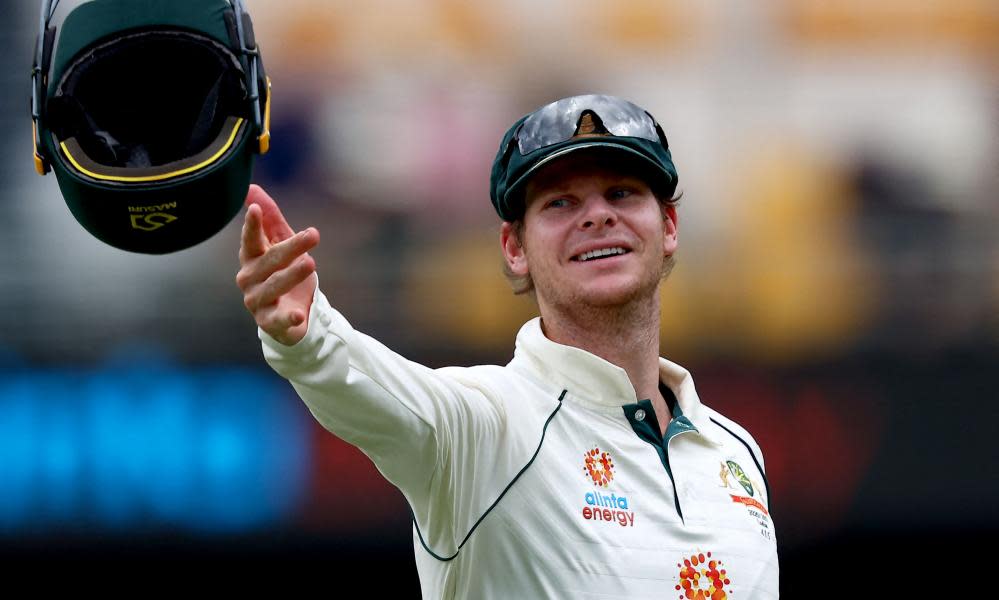Has enough time passed for Steve Smith’s sins to be forgiven?

It has been more than three and a half years since Steve Smith’s captaincy of the Australian men’s Test team ended in tears. A fair bit has happened since then – enough that the ball-tampering scandal in Cape Town that cost Smith his job feels as if it was from another era entirely.
At the time of the investigation into Smith’s role in the incident, Cricket Australia ruled that “any consideration of future leadership would be conditional on acceptance by fans and the public, form and authority among the playing group.” With Smith announced on Friday as the Test vice-captain, alongside new captain Pat Cummins, the governing body clearly believes these criteria have been fulfilled.
Related: We can feel for Tim Paine the person – honesty is difficult | Geoff Lemon
While Smith’s authority among the players is not in doubt, it is the acceptance by fans and the public that is particularly interesting to consider. The backlash at the time of ‘sandpapergate’ was immense – then prime minister Malcolm Turnbull even spoke to CA directly to urge for the strongest action to be taken. The anger and disappointment of the Australian public was a driving factor behind a harsher-than-usual punishment for a ball-tampering charge.
But while the pandemic has altered our perception of time to the point that an incident from 2018 feels as if it may as well have occurred in 1918, has it been long enough for Smith’s sins to be forgiven?
It is possible that if Tim Paine’s captaincy had come to an end under more illustrious circumstances – a humble retirement after a winning Ashes campaign perhaps – these questions would not even be asked? Smith may have even been reinstated as captain, allowing more time for Cummins to find his feet as a leader. It may barely have raised an eyebrow. But the nature of Paine’s indiscretions and yet another scandal for CA to deal with, meant that they needed an unblemished captain – a ‘golden boy’ who (they dearly hope) will never bring the game into disrepute. A male Meg Lanning, if you will.
This allows Smith to sidle in and enjoy the protection of Cummins’s golden glow
This allows Smith to sidle in and enjoy the protection of Cummins’s golden glow. With the endorsement of a player so universally loved and respected by fans and players, we can remember Smith as the lovable boy with blonde tips who was so delighted to hug a lion cub. The quirky character with so much love for the game that he keeps his teammates awake at night because he simply cannot stop shadow batting in his hotel room. It is doubtful the public will ever forget Smith’s role in sandpapergate, but with Cummins’s backing, they will most likely forgive him for it.
That is not to say the 32-year-old will not be under scrutiny. While the Australian public was united in their condemnation of his actions in 2018, they do not always present such a united front in their expectations of their sporting heroes. From the traditional cricket fans who value Steve Waugh’s style of ‘mental disintegration’ through to younger generations who are more likely to be repelled by notions of toxic masculinity, it is a tough balance to strike.
In the time that has passed since Smith’s captaincy it has become clear that the ball-tampering incident was the result of years of conditioning in the need to win at all costs. The players involved in Cape Town overstepped the mark, but other behaviours which fall into the win-at-all-costs philosophy, such as sledging, risk-taking and playing through injury are often lauded.
Related: Australia make Cummins captain, Smith vice-captain as Paine pulls out of Ashes
The question around Smith’s leadership now is: what did he learn from his fall from grace? Was it simply where to draw the line to avoid further trouble? Is it just a step back from ‘win at all costs’ to ‘win at most costs’? Or was it a broader lesson around leadership – about doing the right thing, even when it’s not popular? Is he ready to assist in ushering in a new era of Australian men’s cricket, one where honesty and accountability are more than just slogans to be emblazoned across a change-room wall?
It is a complex situation to be navigated, especially considering Cummins’s assertion that Smith will play an “elevated vice-captaincy” role and the pair will be more collaborative than the traditional leadership model. It is a mature approach from Cummins, who may well have chosen to walk his own path and make sure to stamp his authority on the captaincy straight up. The fact that he has no interest in this speaks volumes for his suitability for the role. But for Smith, this elevated role means increased scrutiny on his integrity and it remains to be seen how he will cope with that.
With the Ashes less than two weeks away, it is a quick turnaround for this leadership group to gain the trust of the public. But by playing a supporting role to Cummins, Smith has the ability to re-establish himself as an honourable leader.

 Yahoo Movies
Yahoo Movies 
